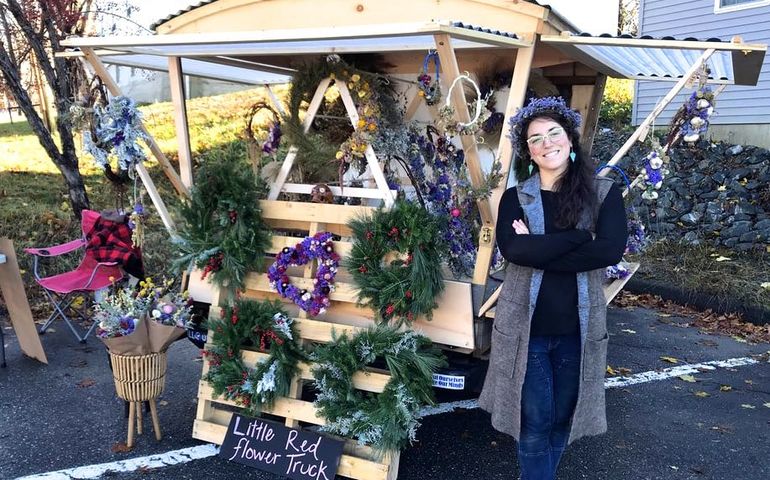
An Ellsworth flower business blooms as pitch-off’s ‘audience choice’
 Courtesy / Little Red Flower Truck
Molly Friedland won the Mount Desert Business Boot Camp’s Audience Choice Award for her startup business Little Red Flower Truck.
Courtesy / Little Red Flower Truck
Molly Friedland won the Mount Desert Business Boot Camp’s Audience Choice Award for her startup business Little Red Flower Truck.
Little Red Flower Truck, a flower farm and floral design business in Ellsworth, recently won the Audience Choice Award during Mount Desert 365’s third annual Mount Desert Business Boot Camp (see sidebar, below).
After a decade of managing vegetable farms in Western North Carolina and estate gardens on Mount Desert Island, Molly Friedland, with her partner Caleb Hawkins, started the business in 2021 to grow and sell dried and fresh-cut flowers in Ellsworth and Bar Harbor. Friedland uses a little red truck for events such weddings, birthday parties, baby and bridal showers, and to serve a small local delivery route.
Mainebiz asked Friedland about her startup journey and plans for the future. Here’s an edited transcript.
Mainebiz: What’s your background?
Molly Friedland: I grew up in Annapolis, Md., and studied sustainable agriculture at Warren Wilson college outside Asheville, N.C., and worked on the college vegetable farm. I worked for different vegetable farms throughout college. When I graduated in 2012, I moved to MDI and worked as an estate gardener. The last head gardener job I had, I developed a cut flower farm for a family and was doing 40-plus floral arrangements every week for them and their guests.
MB: How did that evolve into developing Little Red Flower Truck?
MF: In 2018, I started working with friends who started Fogtown Brewing Co. [in Ellsworth]. I participated in the early stages of the business development and was able to see what it takes to run a small business. The whole time, I was growing cut flowers for fun on my property in Ellsworth. In June 2021, I decided to leave the brewery and pursue the flower business in a more serious way.
MB: What did that start look like?
MF: My partner Caleb has a ’93 Toyota pickup that’s red. He and his dad created a cut flower wagon, if you will — they built a flower wagon on the back. I did a lot of pop-up sales. Because I was close with the brewery, I was able to pop up there and sell mixed bouquets to folks sitting in the beer garden. I also sold prearranged bud vases to restaurants and the brewery and a couple of farmstands.

Most of my income the first year came from custom-order dried wreathes and pop-up markets from September to January, selling dried flower wreaths and arrangements.
MB: What were your startup costs?
MF: Startup costs were minimal. All of the spaces we leased [for growing] have been pretty much for free. This year we’re leasing an acre for $1 per year through a friend.
As far as infrastructure, we already owned the truck and my partner is an arborist, so he has access to lumber. He milled lumber to build the back of the truck and the raised beds. We germinate in our basement under grow lights.
MB: How have you financed the expenses that you did incur?
MF: Personal savings. I also received several grants, including one from Heart of Ellsworth for $1,000. I was accepted into MOFGA’s [Maine Organic Farmers and Gardeners Association] journeyperson’s program and got a $500 educational stipend for online courses. The audience choice award came with a $5,000 prize. That will cover the majority of the cost to build a walk-in cooler.
I’ve also financed my seed and plant costs through community-supported agriculture shares. I’m calling them ‘bouquet subscriptions.’ The CSA is a great way to create cash flow in the lean times of the season, because it’s such a seasonal business. And I have a dozen weddings on the books for 2022. They’ve made deposits, which financed hard goods such as vases and arbors.
MB: What are your metrics now?
MF: I have two CSA locations this year, in Ellsworth and on MDI, where I have 24 CSA members. Beech Hill Farm [a working farm owned by College of the Atlantic in Bar Harbor] will sell mixed bouquets for us. We sell wholesale to two florists. Last year, they were my first line of sale. Now I’ll focus more on direct-to-consumer.
We’re scaling up. Last year we grew on one-eighth of an acre at a friend’s property in Bar Harbor. We needed more space and little bit longer of a lease, so now we’re growing on a full acre on a three-year lease in Hancock.
MB: What are some top uses for flowers?
MF: There are certain crops florists love having, like dahlias and amaranths, which they need for weddings. In 2021, 50% of my sales were wholesale to florists. This year, that will be closer to 25% because I’m expanding my own wedding sales.
MB: How have you been marketing?
MF: I lean into community partners, like Beech Hill Farm, Fogtown Brewing and Heart of Ellsworth. Those are mutually beneficial marketing relationships. I’ve also been pretty active on social media. I ended up booking pretty much every weekend that I had available for weddings without having to pay to advertise.
MB: Do you have employees?
MF: It’s just me and my partner, and he works full-time as an arborist on MDI.
MB: Next steps?
MF: Solidify a permanent land base. We’re going to work with the Farm Service Agency [a U.S. Department of Agriculture lending agency] as a lender. That process is pretty long but would enable us to buy land. We’d like to stay in Hancock County to keep the networking connections that we’ve made thus far. The 2022 growing season will be a big data-gaining year for us, as far as understanding our capacity to grow and the markets.
MB: Does climate change impact the flower business?
MF: It’s extended our season. Our traditional frost date is early October. But last year, we didn’t get a hard frost until late October, if not early November, so I was able to keep harvesting one of my main cash crops, which is dahlias. But pests have become more noticeable and harder to manage. At the small scale we currently grow, we’re able to manage that using integrative pest management.










0 Comments